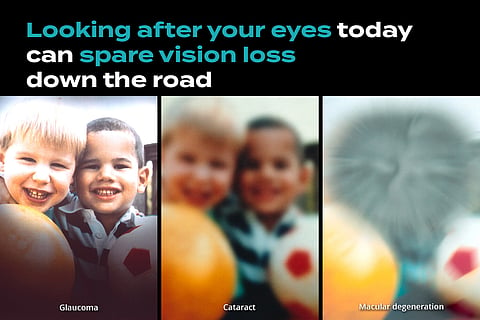Bridging the Gap - Health Equity for all
Your Windows to the World are Delicate Flowers, So Take Care of Them
<p>Would you rather lose your sight or your hearing? It’s a tough choice, but many couldn’t imagine a life without being able to perceive the beauty and visual intricacies of the world. The eyes are incredible organs, yet infamously fragile and sensitive ones all the same: they are susceptible to diseases and impairments that hamper your vision and overall eye health. </p>
<p>Understanding these common eye diseases will help to keep your vision in the best shape possible. Here are seven of the top eye diseases that affect millions worldwide.</p>
<h2>7 top eye diseases worldwide</h2>
<h3>Cataracts</h3>
<p>If you ever had an elderly pet, you probably know this one. Cataracts are one of the most common age-related eye conditions. They occur when the lens of the eye becomes cloudy, which blurs vision and causes sensitivity to light and difficulty seeing in darkness. Age is the main cause, but other factors include diabetes, smoking, and long-term, excessive exposure to UV radiation via sunlight.</p>
<figure><img alt="" height="409" src="https://cdn.storymd.com/optimized/Oo59rxiDoK/original.png" width="639" />
<figcaption>Depiction of a Person With Cataract <em>Source: https://www.myupchar.com</em></figcaption>
</figure>
<p>Treating cataracts usually involves removing the cloudy lens and replacing it with an artificial one. To avoid cataracts:</p>
<ul>
<li><strong>Quit smoking</strong>. Tobacco raises your risk of cataracts. Your doctor can provide resources to help you quit.</li>
<li><strong>Protect yourself against the sun</strong>. Sunglasses (or eyeglasses with an anti-UV coating) can do the trick. A hat with a brim will help too.</li>
<li><strong>Regular eye care</strong>. Talk to your doctor about how often you should come in for checkups. Keep up with your appointments and tell them about any new or evolving symptoms.</li>
</ul>
<h3>Glaucoma</h3>
<p>This is a group of eye diseases characterized by damage to the optic nerve that is usually linked to increased pressure within the eye. Glaucoma is one of the main causes of permanent blindness worldwide.</p>
<p>Typically, it sneaks up slowly and without symptoms until a significant change in vision occurs. Regular eye exams are key to spotting glaucoma early and managing it since treatment can lower intraocular pressure through medications, laser therapy, or surgery. </p>
<h3>Age-related macular degeneration (AMD)</h3>
<p>The macula is an oval-shaped area located in the central part of the retina, and it gifts you with sharp, central vision. As you can probably guess, AMD is more of a problem for older people; it is a leading cause of vision loss in those over 50. </p>
<p>AMD comes in two forms: dry and wet. Dry AMD involves the progressive breakdown of macular tissue, while the wet kind is characterized by abnormal blood vessel growth underneath the macula. There is no cure for AMD, but early detection can help with slowing its progression and preserving the remaining vision. </p>
<figure><img alt="" height="420" src="https://cdn.storymd.com/optimized/LA1V9LTQo5/original.png" width="657" />
<figcaption>Depiction of a woman suffering from age-related macular degeneration (AMD) <em>Source: https://www.myupchar.com</em></figcaption>
</figure>
<h3>Diabetic retinopathy </h3>
<p>As per the name, diabetic retinopathy is a complication of diabetes that affects the blood vessels in the retina. Elevated blood sugar levels can damage these tiny blood vessels, leading to leakage, swelling, and the growth of abnormal blood vessels. </p>
<p>Diabetic retinopathy usually shows no signs in the early stages, but it can cause vision loss if untreated. Managing diabetes through diet, medication, and lifestyle changes is the path to preventing diabetic retinopathy. If you do develop this condition, the treatment options include laser therapy, injections, or surgery. </p>
<h3>Dry eye syndrome </h3>
<p>Not enough tears to cry? That’s kind of what dry eye syndrome is like: people with this condition have eyes that are unable to produce enough tears, or their tears evaporate too quickly. What you get is burning sensations, redness, sensitivity to light, and fluctuating vision.</p>
<p>Aging, environmental conditions, certain medications, and underlying health issues can all contribute to dry eye syndrome. We counteract the problem by using artificial tears, prescription eye drops, lifestyle modifications, or in extreme cases, surgery to block tear ducts and conserve tears.</p>
<figure><img alt="" height="420" src="https://cdn.storymd.com/optimized/OoYyVGHMoG/original.png" width="657" />
<figcaption>Depiction of a person suffering from Dry Eye Syndrome <em>Source: https://www.myupchar.com</em></figcaption>
</figure>
<p>Anyone can get dry eye syndrome, but you’re more likely to do so if you:</p>
<ul>
<li>Are 50+ </li>
<li>Are female</li>
<li>Have insufficient vitamin A (found in carrots, broccoli, and liver) or omega-3 fatty acids (found in fish and walnuts)</li>
<li>Wear contact lenses</li>
<li>Live with an autoimmune condition like lupus or Sjögren syndrome</li>
</ul>
<h3>Conjunctivitis (pink eye)</h3>
<p>Conjunctivitis refers to inflammation or infection of the conjunctiva (the thin, transparent layer covering the white part of the eye; it also lines the surface of the eyelids). It can be traced to viruses, bacteria, allergens, or irritants, and the symptoms can include:</p>
<ul>
<li>Redness</li>
<li>Itching</li>
<li>Tearing</li>
<li>Discharge</li>
<li>Crust formation</li>
</ul>
<p>Most cases of conjunctivitis clear up on their own or with straightforward treatments like eye drops and a compress. Some types may require prescription medicine.</p>
<h3>Retinal detachment</h3>
<p>It’s unnerving to think about, but your retina can pull away from the underlying tissue, disrupt the blood supply, and mess up your vision. Common symptoms include sudden flashes of light, floaters, and a shadow over the field of vision. </p>
<p>Retinal detachment is considered a medical emergency; you need surgery to reattach it and prevent permanent vision loss. Retinal detachment can happen due to aging or an injury (such as trauma from a car crash).</p>
<p>Since this condition is mostly caused by aging, there’s often no way to prevent it. You can lower your risk, however, by wearing safety goggles or other protective gear when engaging in risky activities like sports. If you experience any symptoms, go to your doctor or an emergency room immediately.</p>
<h2>More on Eye Diseases</h2><ul><li><a href="https://soulivity.storymd.com/journal/rjygroyiyj-eye-diseases" target="_blank">Common Eye Disorders and Diseases</a></li><li><a href="https://soulivity.storymd.com/journal/6wxddeqizm-aging-and-your-eyes" target="_blank">The Effect of Aging on Your Eyes</a></li><li><a href="https://soulivity.storymd.com/journal/wx4x4nqfzm-healthy-vision" target="_blank">Healthy Vision for a Lifetime</a></li></ul>


